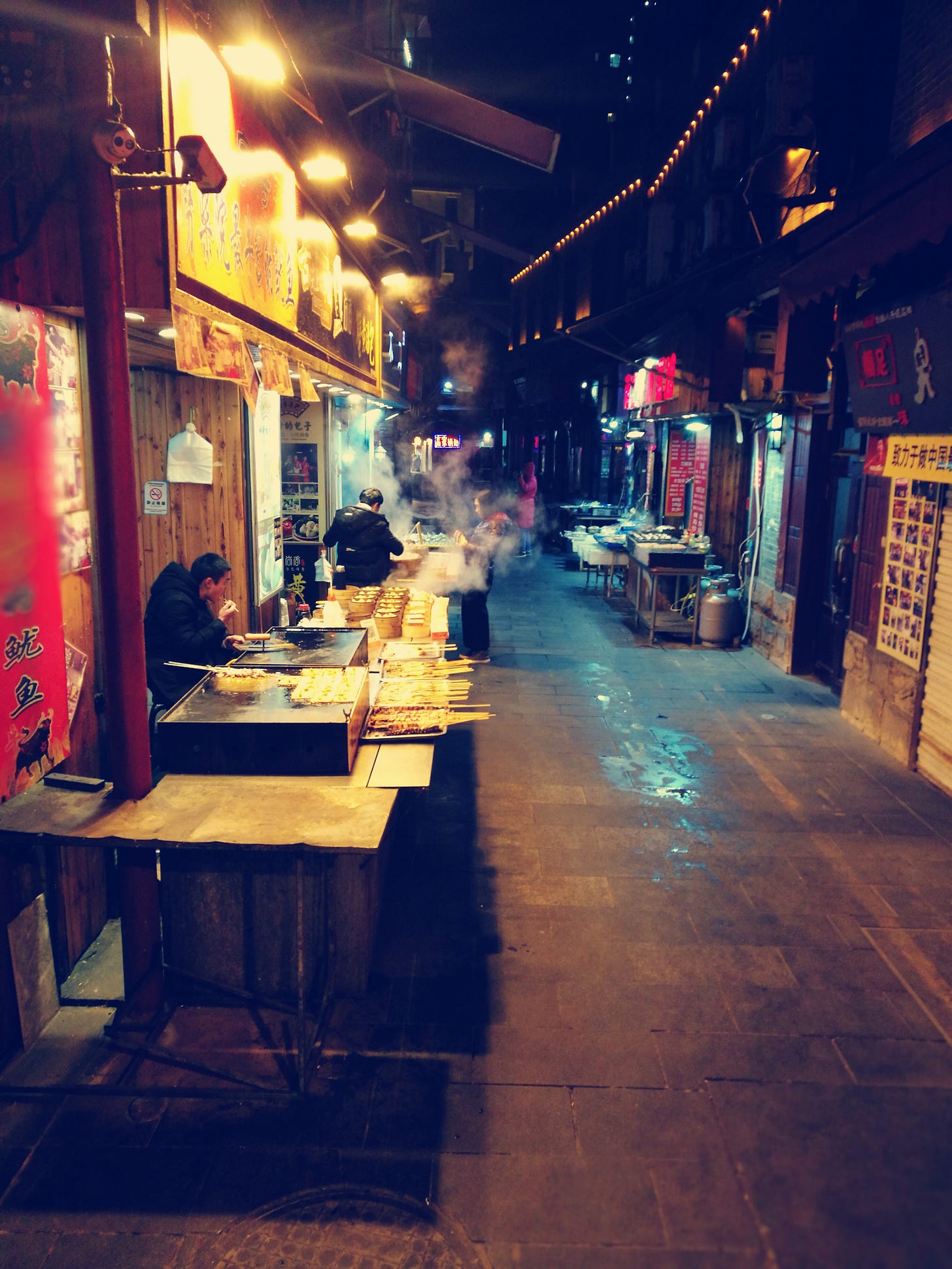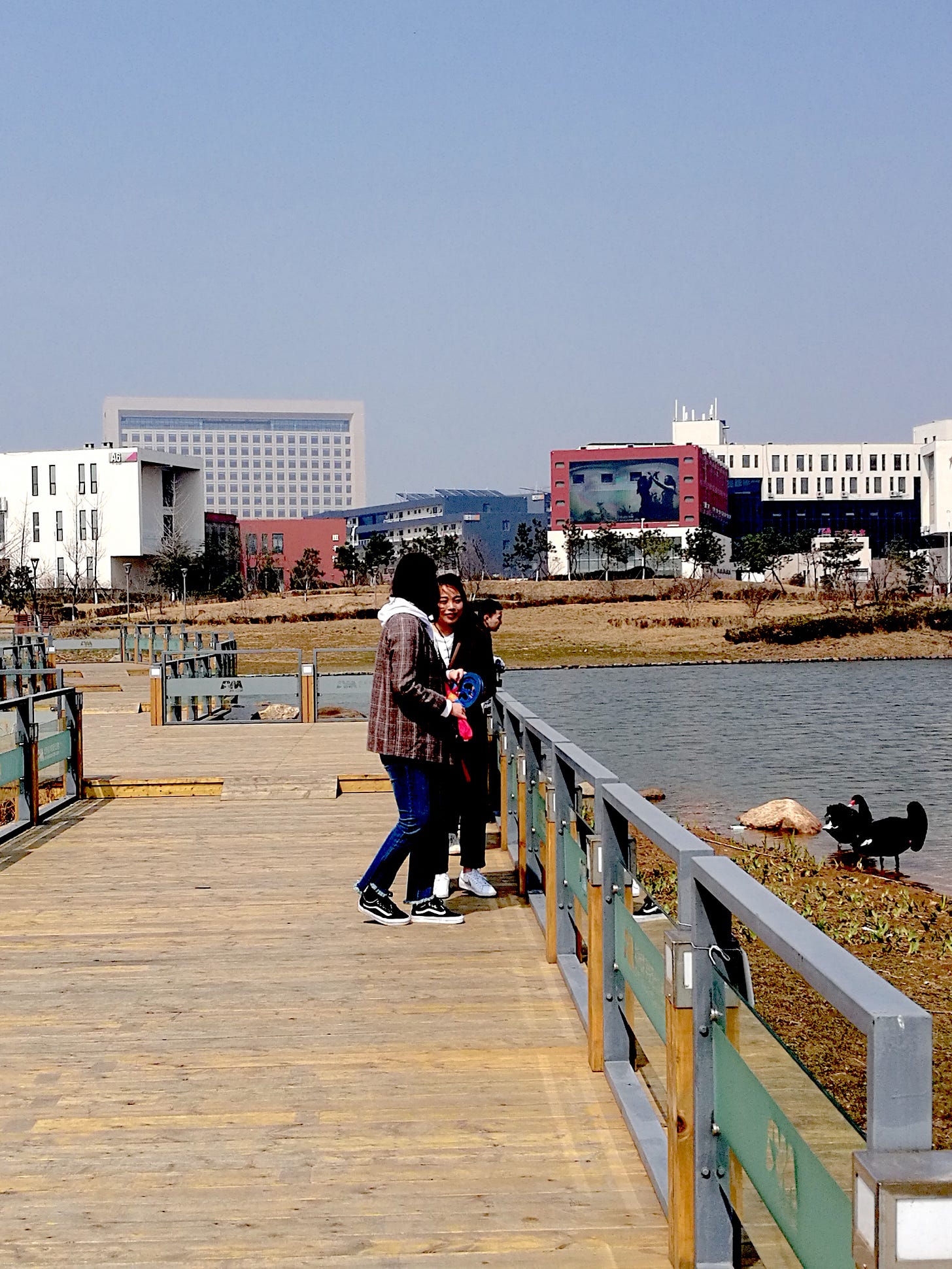China. Deeper into the East-West Divide
Situ - Father of Documentary - Films, surveillance, happiness and the public toilet in Nanjing!
So, here we are, Vivi and me …
(Continued from my last Substack - read here)
It’s 40 degrees, the air thick with the sounds of crickets and the sea. However a wind is blowing up, in the far distance clouds hover over the Laoshan mountains. We sleep late and wake late. My dreams are incredibly lucid. Each morning, Vivi asks me about my dream, I ask about hers. Nǐ de mèngxiǎng shì shénme? (I am teaching her some Chinese, and she’s so excited about learning it.) One dream is about going back to the film school, to work.
I ask Wang Ying if we can go, now!
We leave the family sleeping and jump on his bike. For a moment, I feel I’m back here and heading to class, while the end-of-almost-summer holidaymakers are busy buying up last-minute rubber rings for one more yóuyǒng (swim). The summertime landlords stand on the side of the road with signs, hoping for a passing-by renter. Even though the weather is still scorching, there's an end-of-summer feeling in the air, the winds are telling us this.
Some students wander around campus
—newbies, from far afield: Tibet, maybe Dōngběi on the border with Russia, Xinjiang in the far west—looking a bit dazed and utterly lost in this vast and beautiful complex, now 12 years old.
When I started here in 2015 there were only 2,000 students; now, there are 5,000, with new departments opening. The school was founded by professors from the Beijing Film Academy, known as the Fifth Generation— or China’s new wave, those who came to study when the academy reopened in 1978 with the opening-up policy. There’s a deep sense of prestige and authority in any film school as cinema in China is regarded not just as entertainment but as a high art form. David A. Cook - author of A History of Narrative Film says; Chinese cinema is “taught and understood as another form of literature.”
The tiny school shop is still in the same place, and the magpie nests are also still there and they shriek and cackle as the shopkeeper—sadly not the same anymore—loads wares from a small van and onto the shelves. I enter. Oh, how I loved coming here and using my school card, with an allowance of about 600 yuan a month, bit like winning the lottery. I buy jelly sweets to take home to Alyosha my daughter, and hot chilli tofu sticks to chew on, then wander to the canteen, where the bubble tea shop is the only stall open. Nostalgia hits me, and even though it does not taste like it used to, I savour every sip. Fresh fish hang to dry on the fence, and this time next week, the courtyard will be busy-full of activity, students and films crews everywhere.
I walk into the now-deserted first-floor hall of the Direction Department. This used to be run by Mr. Situ Zhoudun - known as the Father of Chinese Documentary Film. He passed away last year, and I sincerely miss him. We were good friends.
Some of his honours are: Outstanding Contribution Award for Promoting the Development of Chinese Documentary Films from the China Television Documentary Academy. The Lifetime Achievement Award from the Sino-French Documentary Biennale. His contributions were recognised with the prestigious “Golden Candle Award,” the highest honour conferred by the Beijing Film Academy.

I later meet Madame Gong lǎo shī (teacher), in a cafe with Wang Ying - she is the ex Chair of our cinematography department, an outstanding, award-winning educator, and author of many academic books on film style. She tells me that Situ lǎo shī had played a pivotal role in shaping the renowned class of 1978 at the Beijing Film Academy. I feel a sense of awe, she is the classmate of Chen Kaige, Tian Zhuangzhuang, and Zhang Yimou three of China’s greatest filmmakers. “Situ helped these filmmakers, and and educators like me, create a unique renaissance in Chinese cinema, reshaping its narrative and visual style.” She says.
“Madame Gong,” I ask, “Did you ever want to leave China to live elsewhere?” “No, I deeply love my country with all the complexities and difficulties, it is my country, I feel alive here. I travel, but, I always come back.”
This opens up the discussion I wanted to have on the East-West divide; a chasm deeply influenced by cultural forces and used very much in the media, on both sides.
China is opening up it boarders more freely with the introduction to Visa free entry for fifteen countries with permission to stay up to two weeks. This is a first and thousands of people took and are taking advantage of this. Hundreds of videos by foreign tourists who are surprised by what they see, have flooded China’s TikTok - Douyin, and YouTube. (Interestingly, as I write, Douyin is wrangling with the US who want to shut it down in the States due to suspected data breeches. See this report.)
To allow visitors into China without the obstacles of obtaining a visa is China’s response to the West.
Come and see for yourselves, then judge!
In my last Newsletter I spoke about Xihu and happiness and how, someone like Xihu—a young Chinese woman married to a man 30 years her senior, with a young child, Doudao— finds happiness in this sometimes repressive society.
She lives in a spacious flat overlooking Huangdao beach, has a healthy, and happy little girl, and a husband who adores her, Wang Ying. They have enough money to dine out, pay for piano lessons for Doudao, send her to a nearby school, access instant healthcare, and enjoy a circle of friends from Yunnan who live in the compound. Xihu is less concerned with control and repression than with pollution, which, in four years, has nearly vanished from Qingdao due to the city’s green initiatives and electric vehicles. China is now the world leader in renewable energy.
In his 2020 speech at the U.N. General Assembly, President Xi Jinping declared that China would hit its peak emissions "well before" 2030, reaffirming its commitment made during the 2015 Paris Agreement. Additionally, he introduced an ambitious new goal for the country to achieve carbon neutrality by 2060. A comprehensive shift toward renewable energy would be crucial to accomplishing these objectives. (Segment taken from the Yale School of the Environment.)
Xihu participates in the compound collective that plants flowers and shrubs. She has her small nail business and can send money home to her Yi village folk in Yunnan. She is always singing or humming, which is quite current among Chinese people. I equate this as an inner happiness.
FILMS. May, 2019
Mr. Situ lǎo shī invites Wang Ying, myself and some dedicated students to one of those wonderful Chinese, long-languid-lunches in a private room, one which is ornate and filled with German classical artworks. (Qingdao had been part of the German empire between 1898 and 1914.) After we eat, Situ speaks to us about Realist and Observational documentary filmmaking. He believes that music should not cut into a documentary, except at the beginning and end, and a true portrait cannot typically be told through the eyes of one or two people because it often lacks the full complexity and nuance of the whole subject. (I always fill my work with music!)
One of the students brings up the recently produced film One Child Nation by Nanfu Wang and Jialing Zhang, a documentary which unveils the lingering trauma and after effects of China’s one-child policy; a film still too sensitive to be shown openly within China. This earned the filmmakers ten awards and 49 nominations, including the prestigious Sundance Film Festival Grand Jury Prize; it stands as a formidable piece of filmmaking. However, the student points out the importance of recognising bias and subjectivity—reminding us that the lens often reflects the narrative the filmmakers wish to tell, and in this case, one fundamentally crafted for a Western audience.
Later, back at home in 2020 I come across a very sharp article written by three scholars—one Chinese and the other two American, all fluent in Chinese—for ChinaFile, whose contributors are journalists, scholars, and other experts working both inside and outside of China. I place it in my for one day file. This is now the time I can take it out. While these three women herald the film, they also critique Nanfu Wang and Jialing Zhang for what One Child Nation leaves out. "The film’s opening credits juxtapose luminous jars of aborted and abandoned fetuses against a military parade of robotic marching soldiers. Equating propaganda with lies, violence, and farce, One Child Nation at once reveals and recycles the logic, power, and aesthetics of propaganda." (Read the article here).
I also found the Henry Kissinger report written in 1974: The National Security Study Memorandum 200. Basically, the U.S. was very worried about overpopulation in developing countries which could lead to significant global instability. It proposed that the U.S. should consider various strategies to manage this issue, including supporting family planning programs and exploring economic development initiatives that could help stabilise these regions. The underlying concern was that unchecked population growth might lead to resource depletion, increased poverty, and potential geopolitical conflicts, which could ultimately affect global security and American interests. (This report, may or may not have influenced this policy, but, it is something to dwell upon.)
As I write, six years from that day when we all drank jasmine tea and ate copious Qingdao fish dishes, I reflect. Wang Ying, learned, from a family of artists and intellects, whose father had served time in prison during the cultural revolution came from a family of three. In all the time we shared a home in Montreal, Canada, he never spoke to me about emotional pain, and how, as an educated Chinese youth 知識青年 being sent to work in the countryside and do hard farming labour was, for him, a great escape from dull life in Nanjing.
“Why was it fun?”
“Because we were young, could run free, learn things we would never have the chance to learn. We loved it. We did. I did.”
Control - another subject of fascination for the West
Jialing Zhang’s latest film, Total Trust, (2024) explores the pervasive use of surveillance cameras in China, and examines how our fundamental human freedom is being eroded, not just here, but worldwide.
You can view the documentary it on multiple channels, and here I am, in Huangdao once more, trying to spot and count cameras. Yes, it's true—they are omnipresent, at every crossroad, high up on pylons, in every direction, E.N.S.W; every few meters. In elevators, in buildings, in the station, shops, trains, and hey, maybe even hidden in our homes, as Zhang suggests.
However, it doesn’t really bother me or my friends. I can film openly and have never been stopped. I can ask many questions and have seldom been told to shut up. And it doesn’t seem to bother most of the people I’ve talked to.
People express loudly about all sorts of things, hang out, loiter on street corners, and drink in groups late at night with animated conversations.
After going to school, the skies open wide and the rains pour down. I meet my artist friends and we find a tiny tea shop in the compound. We drink green tea, eat moon cakes and nuts; a tiny delight, and chatter.
I listen and try to pick our key words, very hard as much is repartee, and fuddled with metaphors. They discuss various issues passionately, from relocations and the fact that L cannot hold his film festival without police interventions, so this means changing venues each time and limiting numbers, to ineffective local government policies, overspending, and more, with Y translating for me while the tea shop manager sits in the next room, overhearing everything. As Wake says, if every single person in China were stopped for thinking and speaking freely, the entire country would be in prison. “We are neither stupid, nor deaf, nor dumb, nor blind.”
Fact:
China is the global leader in CCTV surveillance, with approximately 200 million cameras, compared to around 50 million in the USA. Germany ranks third with 5.2 million cameras, while the United Kingdom follows closely in fourth place with around 6 million CCTV cameras. (Wikipedia)
I now put this in perspective: China has a population of 1.6 billion, compared to 67 million in the UK, 336 million in the US, and 84 million in Germany.
The eyes…
Professor Ariane Ollier-Malaterre, who holds the Canada Research Chair in the Regulation of Digital Technology in Professional and Personal Life, wrote a fascinating article in March 2024 for the academic journal The Conversation. She asks: How do Chinese citizens experience this constant surveillance?
In her book Living with Digital Surveillance in China: Citizens’ Narratives on Technology, Privacy and Governance, she presents research she conducted in China in 2019. Specifically, the book is based on 58 semi-structured in-depth interviews with Chinese participants recruited through colleagues at three universities in Beijing, Shanghai and Chengdu. Read here:
Later that night Wang Ying I have a meeting with the head of the new International Department in the Film School. Her English is excellent. We discuss some of the shortcomings of the school system in preparing students for studying abroad, particularly the need for them to learn another language, especially English, and to gain confidence in adapting to new cultures. As a result, the international sector is open and collaborates with other countries. She asks me if I can speak with Kent University which has a innovative film program and hosts many Chinese students already. Would they be interested in working together? The idea will be for me to come back and do some presentations at a later date.
"The Chinese government, she says, understands that these students will leave, live abroad, read international literature, watch YouTube, and absorb as much information as they can before returning home. Will they be interrogated or required to confess what they have seen, heard, and done in the outside world? No.
However, there are always some exceptions. In 2017, a young student, Yang Shuping, delivered a graduation speech at her university in Maryland, US, celebrating 'the fresh air of free speech.' I was at school teaching the day the video went viral. My students showed me. By the time class was ended it had spread across China."(See it here.) I asked them how they felt about what she said. Most said they felt it was unfair.
I said nothing. National pride is very high in China.
So, it is time that I leave these subjects be and get back to the girls and Xihu.
Wang Ying and I come back the slow way which winds around the beach. The rains have stopped, the winds have fallen, and peace falls onto the beach as all the holidaymakers have gone.
We have promised the girls hotpot tonight and a ride on Xihu’s bike.
Xihu surprises us. "I’ve bought us tickets to Nanjing; we’re leaving tomorrow. There’s a place we must see."
I imagine it will be the famous Fuzimiao with its winding roads, temples, food stalls, floating lanterns, and sensual canals where kings and courtesans would meet in hushed homes?
No, she says, "I’m taking you to the most amazing toilet in the world!"
So, I’ll leave you with a tour of toilets and malls.
Next week I will conclude with my artist friends, song, poetry, performance, and the Qingdao Qilu Hospital where I tell the final story about my healing brain which was operated on by the wonderful Dr. Wang. (Today marks five years since my operation!)
And, talk about the archives in Qingdao, where Wang Ying and I are working on a project about Huangdao Lu, the old district that has been uprooted, renovated, and cleaned up to create a tourist space. The head of the municipal archives told us that we are among a few people who filmed with our students and they are interested in having our documentation.
I finish with Mr. Situ in mind.
Documentary filming is so much more than winning awards; it is about preserving for the present and future generations.
Thank you so much! It is not easy to write about such complexities easily. I just like to lift the veil, slightly, to give another perspective as a storyteller.
Thank you so much for reading and sharing. Please pass this on, share on the Substack comment below, as it makes me feel so good when I know you enjoy and have learnt something new.
Have a great week ahead.
Jeanne







Jeanne, thank you so much for giving us such fascinating insights into Chinese society and life in the film school. You account makes us feel we are actually there. Loved the film of the high-tech toilet and the mall. Andrew
Dear Jeanne, I just finished watching your documentary and I’m truly captivated! Loved the photos and reading about the moments you shared with Violette, Ying, Xihu and Doudao. I especially loved getting a glimpse of Qingdao, where you used to teach. Your storytelling is not only enlightening, it inspires me to visit China one day. I can’t wait to read your next instalment:)